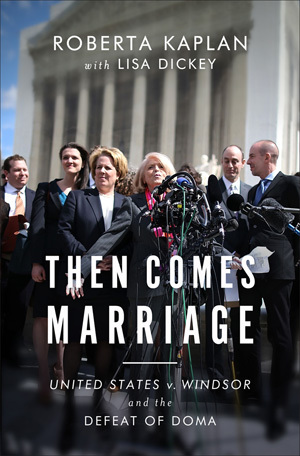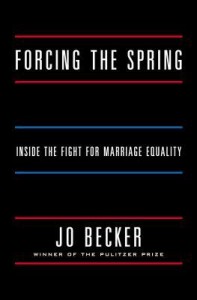 Then Comes Marriage: United States v. Windsor and the Defeat of DOMA by Roberta Kaplan, Lisa Dickey, Edie Windsor
Then Comes Marriage: United States v. Windsor and the Defeat of DOMA by Roberta Kaplan, Lisa Dickey, Edie Windsor Formats available: hardcover, ebook, audiobook
Pages: 336
Published by W. W. Norton & Company on October 5th 2015
Purchasing Info: Author's Website, Publisher's Website, Amazon, Barnes & Noble, Kobo, Bookshop.org
Goodreads
Roberta Kaplan’s gripping story of her defeat of the Defense of Marriage Act (DOMA) before the Supreme Court.
Renowned litigator Roberta Kaplan knew from the beginning that it was the perfect case to bring down the so-called Defense of Marriage Act (DOMA). Edie Windsor and Thea Spyer had been together as a couple, in sickness and in health, for more than forty years—enduring society’s homophobia as well as Spyer’s near total paralysis from multiple sclerosis. Although the couple was finally able to marry, when Spyer died the federal government refused to recognize their marriage, forcing Windsor to pay a huge estate tax bill.
In this gripping, definitive account of one of our nation’s most significant civil rights victories, Kaplan describes meeting Windsor and their journey together to defeat DOMA. She shares the behind-the-scenes highs and lows, the excitement and the worries, and provides intriguing insights into her historic argument before the Supreme Court. A critical and previously untold part of the narrative is Kaplan’s own personal story, including her struggle for self-acceptance in order to create a loving family of her own.
Then Comes Marriage tells this quintessentially American story with honesty, humor, and heart. It is the momentous yet intimate account of a thrilling victory for equality under the law for all Americans, gay or straight.
My Review:
This book, like yesterday’s review book, Grant Park, is about a day when the universe changed.
That book centered around the election of Barack Obama. This one concerns events that took place after Obama was elected, events that probably would have taken a lot longer under a different administration.
On March 27, 2013, the Supreme Court heard oral arguments concerning the case of United States V. Windsor, the case that struck down DOMA, the Federal Defense of Marriage Act, as unconstitutional. Windsor became the precedent that enabled courts across the U.S. to strike down state statutes that attempted to restrict marriage. This past summer, in the case of Obergefell v. Hodges, marriage equality became the law of the land.
 Then Comes Marriage is the third book that I have read about this case and its aftermath. Last year’s Forcing the Spring (reviewed here) is an account of the other marriage equality case that came before the Supreme Court in 2013, the case against California’s Prop 8. In some ways, Then Comes Marriage feels like the other side of that story, as the reporter who wrote Forcing the Spring was embedded in the other legal team. And though she interviewed the principals in Windsor after the fact, her coverage of the Windsor case is naturally not as complete as it is for the case that she was personally involved with.
Then Comes Marriage is the third book that I have read about this case and its aftermath. Last year’s Forcing the Spring (reviewed here) is an account of the other marriage equality case that came before the Supreme Court in 2013, the case against California’s Prop 8. In some ways, Then Comes Marriage feels like the other side of that story, as the reporter who wrote Forcing the Spring was embedded in the other legal team. And though she interviewed the principals in Windsor after the fact, her coverage of the Windsor case is naturally not as complete as it is for the case that she was personally involved with.
Speak Now by Kenji Yoshino (reviewed earlier this year) also covers the Prop. 8 case, but from the perspective of a married gay lawyer who was not professionally involved in the case but would be impacted by the result.
I found it interesting that both the Yoshino book and this one take their titles from ages old references to marriage and being married. The other title is a play on the part of the marriage ceremony where the officiant addresses the audience regarding whether anyone can show just cause to stop the impending marriage with the phrase “speak now or forever hold your peace”.
Then Comes Marriage is part of a childhood taunting rhyme, “First comes love, then comes marriage, then comes someone with a baby carriage.” Because after the recent rulings that someone could be a man and woman, two women, or two men. Love is love and marriage is finally marriage.
But this book, as written by the lawyer who argued the Windsor case, starts at the very beginning. And in this beginning are Edie Windsor and Thea Spyer, two women who pledged their love to each other in 1967, at a time before the Stonewall Riots when they secretly hoped but never expected that the marriage that Thea proposed to Edie could ever be celebrated in the U.S. Although they were not able to marry in the U.S., Edie and a terminally ill Thea flew to Toronto in 2007 to get married.
The U.S. recognizes marriages conducted in Canada, but DOMA prevented the U.S. from recognizing Edie’s marriage to Thea. So when Thea died in 2009, the Federal government and New York State presented her with a whopping $600,000 bill for inheritance taxes. Taxes that Edie would not have had to pay if Thea had been Theo or Edie had been Eddie. But not, at that time, both.
Edie chose to fight. This was her case. But she won for everyone.
Reality Rating A-: It’s pretty clear to anyone who has read my reviews of Speak Now and Forcing the Spring that I am for marriage equality. So I was predisposed to like this book from the outset.
As a narrative of the case, it reads differently from Forcing the Spring. That was a legal thriller to rival anything by Grisham. It’s also different because the stars in the Prop 8 case were the two lawyers who argued the case.
In Then Comes Marriage, Edie Windsor is the center of the story. Unlike a lot of civil rights legislation, no one went shopping for a perfect set of plaintiffs to represent the spectrum of the case. Edie had a very specific grievance, and she wanted things to be set right. While the money was important, the real issue was that the government said her marriage did not exist, that her 40+ years of living with, loving, and supporting Thea did not count, that they were legally strangers to each other.
When the story of Edie’s life with Thea is portrayed, it is crystal clear to the reader just how wrong that was. Also the legal case was very clear and relatively simple. The marriage was legally conducted in Canada. The U.S. recognizes Canadian marriages as valid. What was the rational basis for treating Edie and Thea’s marriage differently? And the court came to the conclusion that there wasn’t one.
While the story of Edie’s life felt relevant, the book begins with a section on the lawyer’s life, and how and why she ended up arguing this case. While it seemed fitting that the author’s motives, thoughts and feelings were interjected into the story of the progress of the case at frequent intervals, I wasn’t sure that she was the place to start. The back-to-back biographical sections made the beginning of the book drag just a bit.
But once the case starts proceeding through the courts, the narrative tension mounts at a gripping pace. Even though we know how the story ends, the process of getting there still had me opening the book in unlikely places, just to see how things were going. I felt like the protagonists did while waiting to read the rulings, peeking at any interval just to get in a few more words.
The author’s description of the aftermath of the case reads like a victory lap. And so it should. Edie Windsor, and the author, made the universe change.
